Oil Reaches $105 A Barrel, Making Iran Supplies Attractive
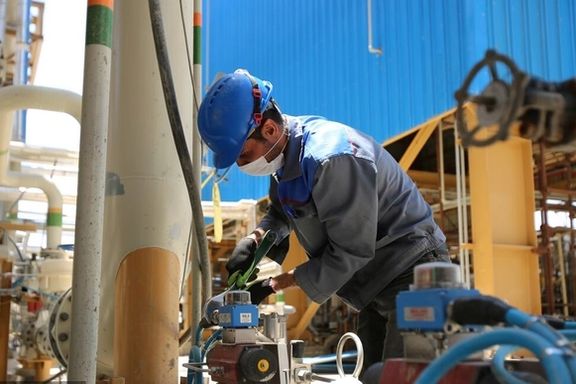
Global oil prices jumped to $105 a barrel, the highest point since 2014, as the Russian invasion of Ukraine led to fears of disruption to world supplies.

Global oil prices jumped to $105 a barrel, the highest point since 2014, as the Russian invasion of Ukraine led to fears of disruption to world supplies.
Although the West has not threatened direct sanctions on Russia’s energy exports, but other sanctions can impact deliveries.
"If sanctions affect payment transactions, Russian banks and possibly also the insurance that covers Russian oil and gas deliveries, supply outages cannot be excluded," Reuters quoted Commerzbank analyst Carsten Fritsch as saying.
At least three major buyers of Russian oil were unable to open letters of credit from Western banks to cover purchases on Thursday, sources told Reuters.
Analysts believe that Brent is likely to remain above $100 a barrel until significant alternative supplies become available from OPEC, US shale or Iran, for example.
Negotiations over Iran’s expanding nuclear program since last April continue with no final result. Although progress has been made, diplomats say some significant issues remain to be resolved. An agreement will lift US sanctions and allow Iran to add to global oil supplies, although its capacity remains limited.
Analysts are warning of inflationary pressure on the global economy from $100 oil, especially for Asia, which imports most of its energy needs.
China has been buying more Iranian oil clandestinely in defiance of US sanctions reportedly building up its reserves in past few months.
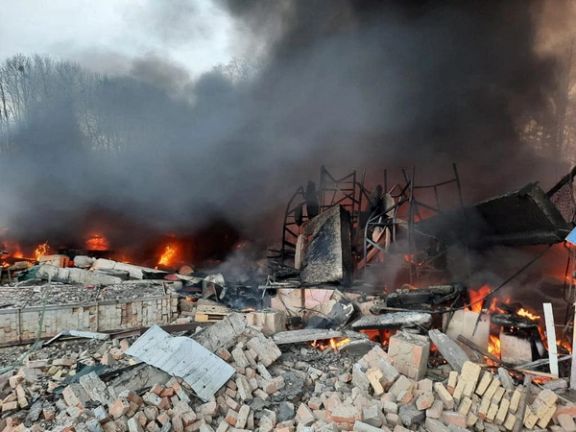
Iran has once again reiterated support for Russia in the Ukraine conflict, saying the crisis is rooted in NATO's provocations.
Foreign Minister Hossein Amir-Abdollahian said in a tweet on Thursday however that Tehran doesn't believe that “resorting to war is a solution”.
He also stressed the need for an “imperative to establish ceasefire and to find a political and democratic resolution”.
Also on Thursday, Foreign Ministry spokesman Saeed Khatibzadeh said that Tehran is monitoring Ukraine developments with deep concern, noting that “US-led provocations” have created a situation which is taking Eurasia toward an all-out crisis.
Khatibzadeh said Iran urges both sides to stop armed conflict and declare ceasefire to start talks.
He also urged all Iranian citizens living in Ukraine to stay away from dangerous areas, adding that the Foreign Ministry is trying to obtain necessary permissions for one or more special flights to evacuate Iranians from some parts of Ukraine.
Iran’s embassy in Kiev issued a statement on Wednesday, calling on Iranian nationals livening in Ukraine, especially students, to leave the country "temporarily".
Early on Thursday, Russian President Vladimir Putin announced a “special military operation” in the eastern Ukraine regions of Donetsk and Lugansk, claiming that he had ordered the operation after the leaders of the self-proclaimed republics of asked the Kremlin for military assistance.
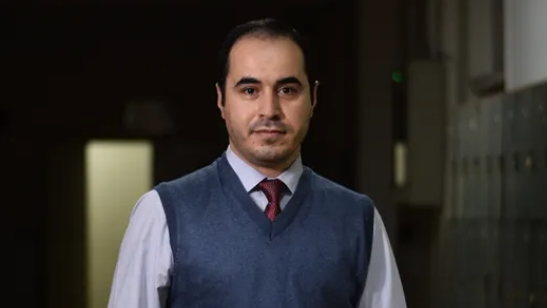
Family and friends of dissident blogger and internet freedom activist Hossein Ronaghi say security forces have 'abducted' him and his whereabouts are unknown.
Masoud Kazemi, a dissident journalist and close friend of Ronaghi who resides in Turkey, told Iran International that he went off the grid at around 11:00 AM Wednesday near his house after leaving for work.
"We don't know who has taken him or where he is being held," Kazemi said, adding that Ronaghi had received several intimidating phone calls in the past few days, allegedly from security forces.
In a tweet Wednesday, Ronaghi's brother Hassan, also an activist, said Supreme Leader Ali Khamenei's office, the Revolutionary Guards, and the Judiciary should be accountable for anything that may happen to him. Ronaghi's father Reza Ronaghi in an interview with Radio Farda Wednesday also said Khamenei was directly responsible for his son's life.
Ronaghi was arrested, along with his brother Hassan, in the aftermath of the disputed presidential elections in 2009 for issuing proxies that allowed journalists and political activists to circumvent internet censorship. He was also charged with insulting Khamenei in his blog posts.
Ronaghi was one of the first to focus his activities against a bill proposed by hardliner lawmakers to introduce highly restrictive internet policies. The bill which is ironically called ‘Users Protection Plan’ and its approval by an ad hoc parliamentary committee with the authority to approve it without putting it to debate on the floor has caused serious concern among Iranians.
"If you can't write the truth about the "Protection Plan" and internet censorship in Iran, do not bury the truth. The Protection Plan was a decision made by the entire regime based on the demand from Islamic Republic's leader who had stated: "Virtual space must be controlled, Ronaghi tweeted on Wednesday before his disappearance.
Khamenei has complained on many occasions, including in a speech on March 21, 2021, that the cyberspace is "unbridled" and should not be "surrendered to the enemy".
According to Amnesty International, Ronaghi was badly tortured in prison after his arrest in 2009 and underwent at least four operations to fix his damaged kidney which could not be saved and had to be removed.
In an interview with Germany's Bild published on January 28, Ronaghi spoke about losing his kidney while in Evin Prison. "I'm still suffering from the effects of the torture, but the good thing is that I'm still alive and can continue," he said. "It was a cruel time; I was sick and didn't get any medical attention. My brother was also arrested and brutally tortured in front of me. I am currently living with one kidney. I've lost a lot, but not my courage," he told Bild.
In recent interviews with foreign media -- which his friend Masoud Kazemi says his arrest may be related to -- Ronaghi has also criticized western media for ignoring violations of human rights in Iran. "Western media aren’t telling you the truth about Iran. For us, it is as if there are two Irans—the one where we live and another that you read about. Reporters [of foreign media] would rather tweet about the weather than investigate repression and torture," Ronaghi told the Wall Street Journal in October.
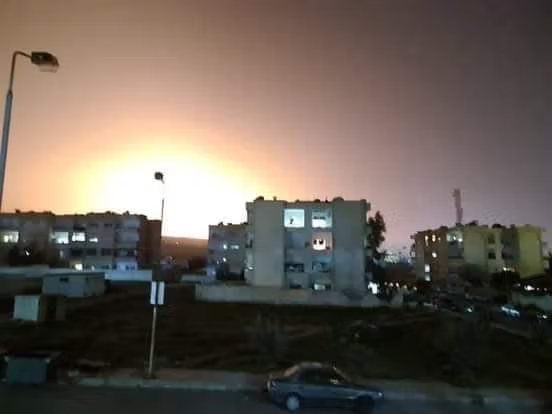
Syria says Israel launched several missiles from the Golan Heights at targets around Damascus, causing several casualties and material damage.
According to the Syrian Observatory of Human Rights (SOHR), a war monitor, the attacks in the early hours of Thursday, targeted posts and weapons warehouses of Iran-backed militias in the vicinity of Damascus international airport.
There were also reports of missile attacks in areas around the border province of Quneitra on Wednesday, where Israel allegedly fired surface-to-surface missiles, causing material damage to an observation post and a building.
Iran International reported earlier this month that Iran-backed militias are setting up settlement along the Israeli border, to be used for attacks against Israel.
Some other missiles targeted the air-defense system in areas along Al-Keswah and Al-Syidah Zaynab districts in south of Damascus. The official Syrian Arab News Agency (SANA) said several explosions were seen over the skies of the capital and its outskirts as Syria’s air defenses intercepted some of the strikes.
Syria’s state media said three people were killed in the attacks while SOHR put the number of casualties at six, saying the attacks killed two members of the Syrian forces and four members of Iran-backed militias, whose nationalities remain unknown.
In a rare statement earlier in February, the Israeli army acknowledged attacks inside Syria, saying it struck Syrian facilities used in targeting Israeli aircraft, including a radar and anti-aircraft batteries.
Israel has launched hundreds of strikes on targets inside government-controlled parts of Syria mostly since 2017, but it rarely acknowledges or discusses such operations.
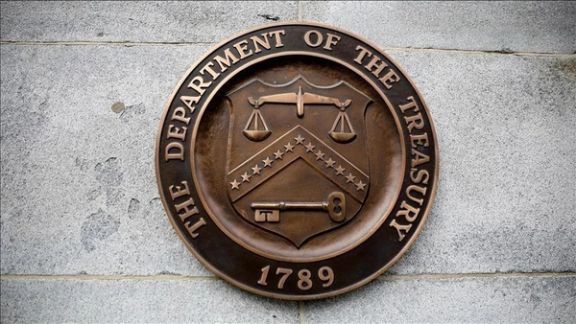
The United States Wednesday sanctioned an international network run by Iran’s Revolutionary Guard and a Houthi financier providing tens of millions of dollars to Yemen’s Houthi rebels.
The complex web of individuals and front companies shipped fuel, other petroleum products and commodities throughout the Middle East, Africa and Asia, with the proceeds financing Houthi attacks in Yemen and on its neighbors, a Treasury statement said.
The action freezes any assets of the designated entities and individuals that are subject to US jurisdiction and generally bars Americans from doing business with them.
The US closely coordinated the designations with its Gulf partners, Secretary of State Antony Blinken said in a statement. He urged the Houthis to "end their campaign of violence" and renew peace talks.
The new designations come as the United Arab Emirates, Saudi Arabia and some American lawmakers press the White House to return the Houthi movement to the US list of foreign terrorist groups in response to recent Houthi drone and missile strikes on the UAE and Saudi Arabia.
Republican former President Donald Trump placed the Houthis on the list 10 days before leaving office, triggering financial sanctions. Democratic President Joe Biden reversed the move, a year ago.
The individuals and firms targeted on Wednesday are part of a network overseen by the Qods Force, the elite arm of Iran's Islamic Revolutionary Guard Corps, and Said al Jamal, a Houthi financier sanctioned last year, the Treasury said.
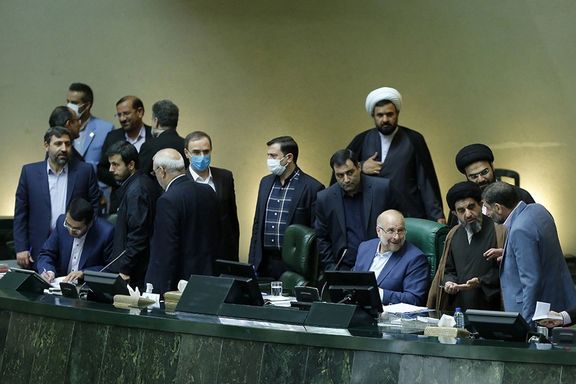
Iran daily, controlled by the Raisi government, has criticized parliamentary amendments to the draft budget it says would widen the deficit in next fiscal year.
The parliamentary committee tasked with examining the government’s draft budget has rejected its proposed transfer of half the oil revenue earmarked for the National Development Fund (NDF). The fund is due to take 40 percent of Iran’s oil income, albeit severely curtailed since 2018 by United States oil sanction.
Iran newspaper pointed out that any major change in budget numbers would lead to a larger budget deficit with "considerable consequences for the government and the country's economy." It would “muddle all of the government plans pertaining to taxes, its expenditure, the budget allocated to development and other things.”
Vahid Shaghaghi, an advisor to the minister of economy, backed the newspaper’s criticism of the parliamentary committee’s proposals. He estimated they would add 1,370 trillion rials ($5.5 billion) to the projected deficit in the government’s draft budget put at around 3,000 trillion rials by Hadi Qavami, a deputy at the Economy Ministry ($11 billion) in January.
"The parliament should not disarrange the structure, form and key variables of the budget bill,” Shaghaghi told the official news agency IRNA. “They will impose a [larger] deficit on the government if they increase or decrease the value of indicators or jumble revenue figures … [leading to] discontent for which the government will be held to account.”
The parliamentary committee has also suggested that the government needs approval from Supreme Leader Ali Khamenei for its proposal to borrow from the NDF. In 2020, Khamenei did not agree with the Rouhani administration's plan to transfer money from the NDF.
Tempting pot
The NDF, and its predecessor the Oil Stabilization Fund, is intended to ringfence a portion of oil income for capital investment, but even before ‘maximum pressure’ it proved a tempting pot for governments looking for a source of current spending.
The government’s draft budget assumes Iran sells an average 1.2 million barrels per day (bpd) of oil at $60 per barrel. The parliamentary committee has hiked this to 1.4 million bpd at $70, thereby reducing the need to draw down from the NDF.
The easing of sanctions with the possible renewal of the 2015 nuclear deal remains an imponderable, and Iran’s production capacity and growing domestic consumption also complicate budget calculations.
Iran is currently selling around 1 million bpd of oil. Analysts are unsure what it might sell if sanctions are eased with the revival of the 2015 nuclear deal, or how quickly Iranian oil might return to markets.
“If sanctions are eased, the gradual addition of up to 1.3 million b/d [barrels per day] of extra oil over the remainder of 2022 and into 2023 could help stabilize global inventories and prevent a further ramp up in prices,” Reuters market analyst John Kemp wrote Wednesday.
Realities on the ground
The parliamentary committee is also disagreeing with the government’s proposal to stop allocating foreign currencies at a below-market rate of 42,000 rials to the dollar for essential imports while assuming a general rate of 230,000 rials. Instead, the committee proposes to earmark $9 billion in foreign currency.
Speaking to Aftab News, former conservative lawmaker Gholamali Jafarzadeh said the whole budget process had “no connection with the realities on the ground.”